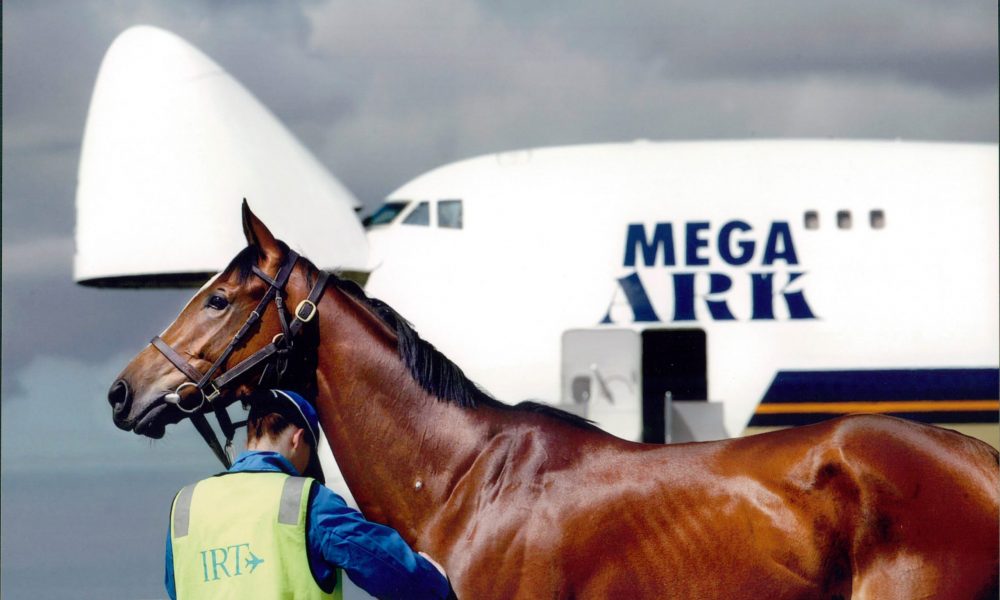Grounded planes leave horses and shuttle stallions in limbo

International Racehorse Transport halts operations due to Covid-19
International Racehorse Transport (IRT) is working with domestic and overseas authorities in a bid to develop protocols that would allow equine flights to restart during the coronavirus pandemic that has seen air travel cease.
Chris Burke, IRT’s managing director, yesterday revealed that the company’s last flight took place on Thursday before a complete shutdown of horse air travel was enacted as world leaders continue to attempt to slow the spread of Covid-19.
“Obviously, in light of what the world is trying to do in terms of reducing the risk, we need to strike a balance between trying to resume commercial operations but at the same time doing it in a safe way,” Burke told ANZ Bloodstock News yesterday.
“The main thing we’re working on now is trying to find a medium-term solution whereby flying grooms is seen like aircraft staff and that they are in isolation when they are on the ground.
“The freighter aircraft themselves are playing a more important role than ever flying around the world because there’s limited freight moving in the belly of passenger aircraft.
“The freighters are having to take on a heavy burden of all these pharmaceuticals and all these other things that we require (being shipped globally).”
IRT management has begun talks with major Asian racing jurisdictions in a bid to develop a plan to allow horse movement prior to the peak May to July period.
“We usually have monthly flights to all those destinations (Singapore and Hong Kong) and obviously trans-Tasman flights multiple times a week and then also imports from the northern hemisphere, so they are all on hold,” he said.
“But already we are working with the Hong Kong Jockey Club and the Singapore Turf Club to try and find a solution in the medium to term to allow those racehorses to travel to those Asian countries where they are needed for racing.
“The list of horses that want to get up there is building and, traditionally, May, June, July is a busy time to move horses up to those destinations, so we need to try and find some solutions by then.”
New Zealand Air Freight also stopped services early last week after the country’s prime minister Jacinda Ardern moved to level four restrictions in the fight against the deadly virus.
The standstill could also make it difficult for the three international horses competing at The Championships in Sydney in the next couple of weeks to return home.
Japan’s Danon Premium (Deep Impact), who is targeting the Queen Elizabeth Stakes (Gr 1, 2000m) on Saturday week at Randwick, is booked to depart on April 20 but that plan now needed to be reconfirmed while arrangements for UK trainer William Haggas’ pair of Young Rascal (Intello) and Addeybb (Pivotal) remain unclear given the current shutdown.
Burke also remains confident that a viable solution can be agreed upon by government officials in time for equine flights to resume to allow shuttle stallions to stand in the southern hemisphere later this year.
“(If it got to that) then we perhaps need to look at charter options by sending a whole plane up to collect them and bringing them back (to Australia),” Burke said.
“The beauty is, we are only talking about a limited number of people that get on a freighter aircraft.
“Typically, a freighter aircraft would have a maximum of five people on board and if that means that we have to quarantine those staff before they go and quarantine them when they come home, as long as we know we are safe to do it, then we will be looking at those options.”
The likes of high-profile shuttlers such as Justify (Scat Daddy) and American Pharoah (Pioneerof The Nile) from Coolmore and reverse shuttler Exceed And Excel (Danehill) from Godolphin, who both operate their own equine flights, and the return of Widden Stud’s champion first season sire Zoustar (Northern Meteor) could be in jeopardy if air transport remains in limbo.
Stallions arriving from the northern hemisphere need to undertake 14 days of quarantine before being allowed to return to stud farms. The breeding season begins on September 1.
“In relation to the shuttle stallions, it’s certainly not something that we have in any way given up on. There’s a lot of time, as you can see it’s a very fluid thing at the moment and seems to change daily,” he said.
“We are working with the government as they want to keep trade going where possible and, obviously, we have to be careful (about coronavirus) whether we are in the air or not.
“Staff are still looking after the horses and, as I said, we are only talking about a small number of people that would need to accompany a horse and we could isolate when they do return.”
Like many businesses affected by the coronavirus shutdown, IRT has placed some staff on leave while Burke contemplates how best to keep the company functioning in a time of strict people movement protocols.
“We are clamping down on expenses that we don’t have to pay and working with landlords and things like that from everywhere around the world,” he said.
“We are tightening the belt but at the same time seeing what (government) programs and measures are in place (to assist businesses). From a business point of view, flights are on hold at the moment.”


